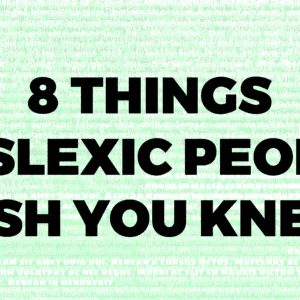
Dyslexia is a condition a lot of people think they know a lot about, but in fact, they actually don’t. That’s not their fault though! There’s a lot of harmful stereotypes and misinformation out there that has led to these views. So we’ve collated 8 Things Dyslexic People Wish You Knew!
Dyslexia affects the way our brains understand information, not the way we read. In fact, we read the exact same way as non-dyslexic people it’s just our brains process the information differently. This difference in our brains affects the way we approach tasks, friendships, dealing with money, cleaning and even watching TV. It literally impacts every single part of our lives.
Dyslexia is not related to intelligence, it’s related to how we view the world. Some of the smartest and most innovative people in the world have been Dyslexic, it allows us to view problems and situations from a unique, often unconventional kind of way. You should embrace our points of view.
Most of the time to get to the place as our son dyslexic peers, we have to work twice as hard as them. Because we find reading or writing or maths extremely difficult, it can take us a really long time not to read, but to understand the work that is in front of us because our brains work a little bit differently. Please be patient with us, we are trying our hardest.
Having accommodations such as a laptop, tablet, extra time in exams or a scribe don’t give us an advantage over our peers (despite what teachers might say). It actually puts us on a level playing field against our peers, allowing us to reach our full potential. Denying us these accommodations can seriously reduce our chances in education and it’s frankly unfair to do so.
Due to experiences, we may have faced in childhood, adults with Dyslexia can stuff from low self-esteem. This can be down to bullying or not feeling good enough, we tend to judge ourselves alongside our non-dyslexic peers. This often means that we are our harshest critics, we know that we may not be as productive as our co-workers or friends, instead of criticising, offer support, please.
Just because Dyslexic people struggle to read, it doesn’t mean they don’t like it. Some of us can think of nothing better than falling into a book, whether it be a print, audio or E-book for a couple hours and escape the world. Just because it might take us longer, doesn’t mean that we don’t like to do it.
Unlike popular belief we will ALWAYS be Dyslexic, it’s not something that you can cure. As adults most people won’t notice our dyslexia because we have found effective coping mechanisms to mask it, but don’t be fooled, we still struggle. To say that we don’t seem dyslexic to be kind gets kind of annoying when we tell you that we are. Just ask us what it’s like instead and how you can help us. We’ve told you cause we trust you!
Dyslexia is a hard condition to live with and it affects all parts of our lives, but with the right coping mechanisms we can turn it into a superpower. It allows us to approach problems in unconventional ways and it even allows us to change our brains to suit the way we read. We also have incredible imaginations which allow us to be more creative than our non-dyslexic peers.
We hope that these 8 things that Dyslexic people wish you knew have given you some knowledge that you might not have considered before. Next time you meet someone with Dyslexia, why not ask them what they wish you knew and then share that with your non-dyslexic peers.
The last article in our series on Dyslexia is:
https://blog.chewigem.com/6-things-you-probably-dont-know-about-dyslexia/
If you would like to view the whole collection please go here:
https://blog.chewigem.com/decoding-dyslexia-everything-you-need-to-know-about-dyslexia/
If you want any more support, somewhere to vent or just want to meet some like-minded people in a supportive environment, why not consider joining our Facebook Sensory Support Group!
Sensory Matters Podcast
Free Sensory Support Community
Can Chewigems Help Keep Your Teeth Clean?